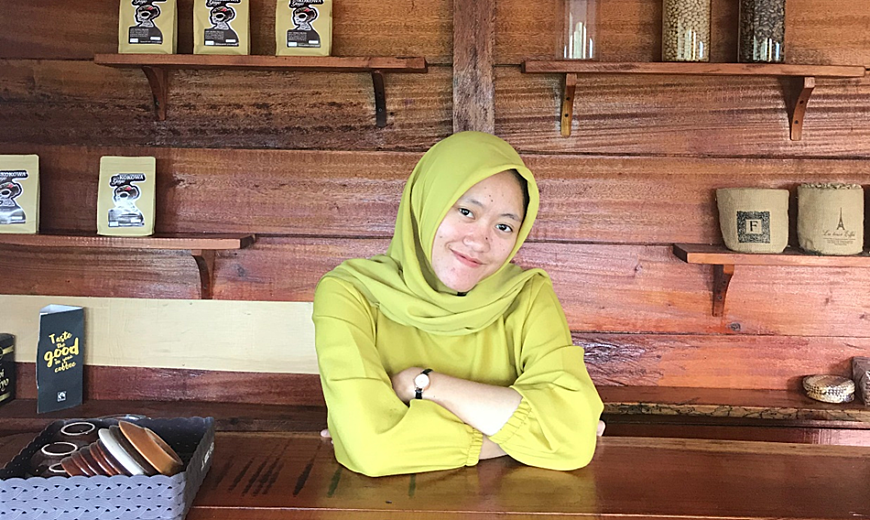Fairtrade youth and climate: Meet Siska Yuliana

It is now a truism: young people around the world are the engines of change when it comes to climate action. And that is certainly the case when it comes to Fairtrade producers, says Siska Yuliana, a Fairtrade Youth Ambassador, climate activist, and member of an all-women Fairtrade coffee cooperative in Indonesia.
Meet the Fairtrade youth climate community
“Youth has a big role in tackling climate change,” Yuliana told Fairtrade in a recent interview. “As youth advocates, we can also form a climate community to voice global aspirations regarding environmental issues and the climate change crisis.”
An active member of both the Youth Council of Permata Gayo and the Youth Council of Kokowagayo, Yuliana has also participated in the Fairtrade Gender Leadership School, putting her front and centre in her community’s efforts to fight climate change and work towards the Sustainable Development Goals (SDGs). With a flair for communication and a focus on sustainable causes, she has been on the forefront of several Fairtrade platforms representing the voices of women youth farmers in the coffee sector.
Q: Please introduce yourself and tell us a little about how you became involved with Fairtrade and climate activism?
A: I am a Staff and Youth Member of Kokowagayo, a Gayo Woman Coffee Cooperative in Indonesia, located in Bener Meriah Regency, Aceh Province, which has been certified by Fairtrade since 2015. Both my parents are small scale coffee farmers. My father is a member of the Permata Gayo Cooperative and my mother is a member of the Kokowagayo Cooperative.
The impacts of climate change have been felt across Indonesia, especially in Aceh. Starting in January 2020, there were heavy rains and flash floods across Indonesia. Though floods and landslides are common during the rainy season in Aceh, this situation was exacerbated by illegal logging and land clearing for factories and industries. As a result, the social, economic, and environmental life of the community has been disrupted. We need immediate actions to protect and preserve the environment, to restore the balance of nature and to create the right conditions for living beings to survive.
As a result, 25 volunteers from Kokowagayo, along with students from the Banda Aceh University, took part in an initiative to start a Reforestration Project called ‘One Man, One Tree.’ We planted 50 trees around the road leading to the waterfall in Wonosari Village which is one of Kokowagayo’s fostered villages. The waterfall here is a source of water for 25% of the villagers.
Though the project may be small, it has helped make our community more aware of climate change and its realities and has encouraged it to take up environmental-based activity programs. Once the community learned about the project, the Al-Fatih Boarding School was also interested in planting trees during the school’s scouting activities. To support the school, we distributed 100 trees to the students and teachers. So, I think no matter how small our efforts were, it had the capability to make a big impact one day.
Q: Climate change is having a disproportionate effect on producer nations, impacting farmers and agricultural workers around the world. How has climate change impacted your community?
A: One of the impacts of climate change that has most affected our region is the declining yield of crops. As of 2017, our crop yield has decreased by 30% due to the prevalence of a bean borer. The pest previously did not live at certain altitudes, but due to increasing warm weather we now find it at higher altitudes. In addition, the decline in crop yields is also related to the loss of forest in our area.
Climate change can also be seen in certain changes in weather patterns which cannot be predicted by producers. Usually in the middle of the year we expect rain. But, instead, we’re now experiencing hot weather which results in lots of empty coffee cherries. On the other hand, at harvest time, when we would normally experience hot weather, we instead get continuous rain – so much so that the coffee beans cannot be dried properly. This is what producers in our region are facing.
Q: How have producers in your community adapted to the pressures and threats of climate change?
A: There have been several efforts to implement mitigation and adaptation by producers in our region through the reduction of carbon emissions. We have been integrating livestock and gardens through the use of plantation waste and livestock waste as raw materials for organic fertilizers; reducing or replacing the use of pesticides and chemical fertilizers with vegetable/biological ingredients; using protective trees as carbon sinks; making biopore holes for flood prevention; utilizing water reservoirs during the rainy season; and making rorak holes as a source of nutrients for coffee plants.
Q: If you could address global leaders face-to-face, what climate action would you demand of them?
If I could address global leaders face-to-face, I would convey that climate change must be taken seriously. And global leaders should get rid of coal-fired power plants and stop deforestation. Besides that, I also hope for countries in the world to help developing countries to overcome climate change, especially in our region. There are many small producers who need this assistance.
Q: Fridays For Future. Zero Hour. Young people around the world have been mobilizing for climate action. As Fairtrade Youth Ambassadors representing producers from regions on the frontline of climate change, what advice would you give to young people seeking to make a difference?
A: Youth has a big role in tackling climate change. This can be done by contributing in all sectors, starting with small things that when accumulated can have an impact on climate change.
In addition, as youth advocates, we can also form a climate community to voice global aspirations regarding environmental issues and the climate change crisis.